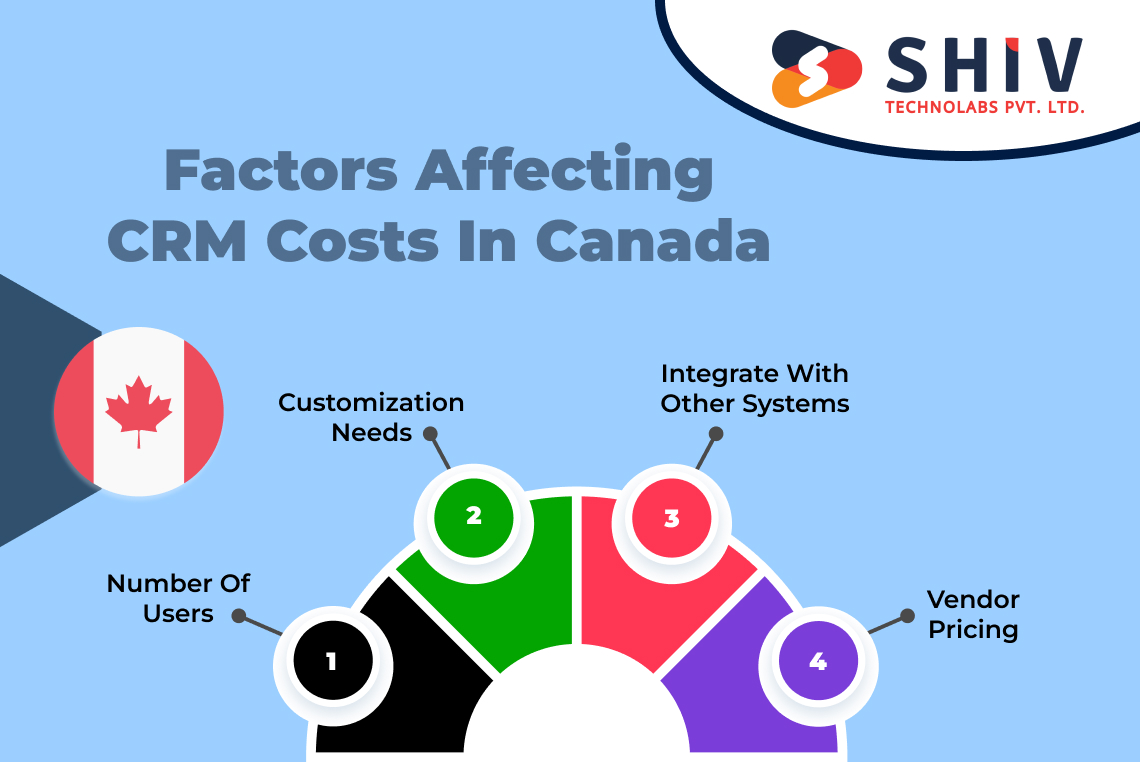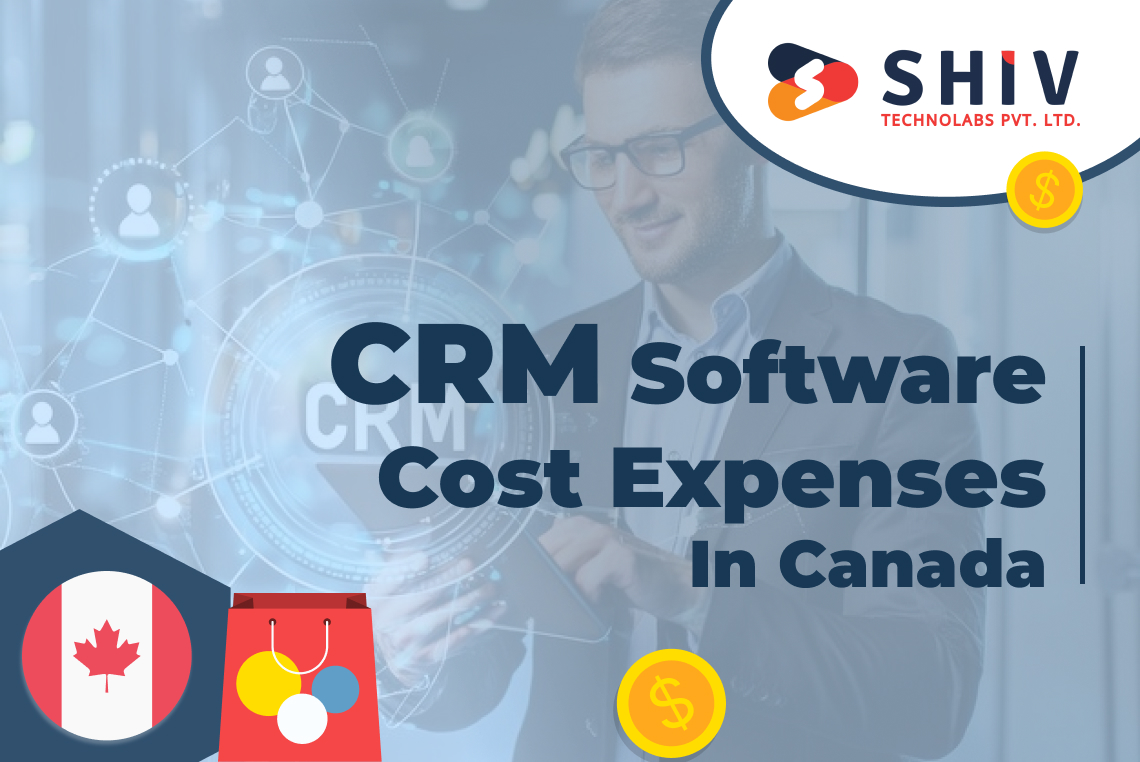Table of Contents
Customer Relationship Management (CRM) software has become an essential element for businesses today, helping them manage interactions with current and potential customers. Understanding its associated costs in Canada is essential for making informed investments; this guide examines each expense related to CRM software in terms of factors affecting costs, pricing models available, hidden expenses associated with investing and the possible returns. Whether considering custom development or off-the-shelf solutions this guide can provide insightful guidance so that informed decisions about choosing a best customer management software in Canada are made.
Understanding CRM Software Costs
The total cost of CRM software in Canada includes numerous components. This includes initial setup costs, subscription and licensing fees, customization expenses, integration expenses and training expenses – each one playing an important part.
- Setup Costs: These expenses encompass purchasing software, installing it, and configuring it to meet your business needs. Costs can range depending on its complexity as well as what features your specific organization requires.
- Subscription Fees: Most CRM software uses a subscription model wherein monthly or annual fees must be paid in order to use its features and applications. The exact costs depend on how many people will use the software and what features are desired.
- Customization Costs: Tailoring CRM software specifically to your business can be expensive if extensive changes need to be made.
- Integration Costs: Connecting CRM software with your existing systems adds to the expense, especially if your systems are complex.
- Training Costs: Teaching your team how to use the CRM system properly is crucial. These costs include training sessions and materials.
Factors Affecting CRM Costs in Canada

Many factors impacting CRM costs in Canada, including business size, number of users, level of customization necessary, integration needs and vendor pricing models. Each factor plays an integral part in calculating total CRM solution costs and must be carefully considered when making purchasing decisions.
Larger businesses with more complex needs typically pay more for CRM software.
- Number of Users: As more people access and utilize a CRM system, costs typically increase proportionately.
- Customization Needs: Requiring many changes for your business can escalate costs significantly.
- Integrate With Other Systems: Integrating CRM software with other systems you use can be expensive if it proves challenging.
- Vendor Pricing: As prices may differ across vendors, it’s essential that you compare costs and understand what is included.
Types of CRM Pricing Models
CRM software providers offer various pricing models, each with its own cost structure and benefits. Understanding these models is crucial for making an informed decision.
- Subscription Model: Paying a regular fee is common. It’s flexible but needs ongoing payments.
- Perpetual License: Paying for a license upfront can be cheaper long-term, but it’s a big upfront cost.
- Usage-Based Pricing: Some CRM software charges based on how much you use it, which can be good if your needs change a lot.
- Free vs. Paid: Some CRM systems are free but may not have everything you need as your business grows.
Hidden Costs of CRM Implementation

When budgeting for CRM software, it is essential to consider hidden costs that can impact the total investment. These costs may not be immediately apparent but can add up over time.
- Data Migration: Moving data from old systems to new CRM software can be hard and expensive.
- Customization and Integration: Making big changes to CRM software or connecting it to other systems often costs more than expected.
- Support and Maintenance: Keeping CRM software working well means paying for updates and fixing problems.
- Regulations: Making sure your CRM system follows laws about data can cost money, like extra security measures.
Benefits of Investing in CRM Software
Despite the costs, investing in CRM software offers numerous benefits that can justify the expense. Improved customer relationships, increased sales and revenue, enhanced data analytics, streamlined business processes, and better team collaboration are some of the key advantages.
- Better Customer Relationships: Managing interactions with customers better leads to happier customers.
- More Sales and Money: Understanding what customers want helps you sell more and make more money.
- Data and Reports: Seeing trends and data helps you make decisions and grow your business.
- Easier Work: Automating jobs makes things go smoother and faster.
- Teamwork: Sharing information means everyone knows what’s going on.
Also read : How Much Does Custom Software Development Cost?
Cost-Benefit Analysis of CRM Software
Conducting a cost-benefit analysis is essential to determine the return on investment (ROI) of CRM software. This involves comparing the long-term financial benefits of the software with the initial and ongoing costs.
- Calculating ROI from CRM Implementation: To calculate the ROI, businesses need to quantify the benefits of CRM software, such as increased sales, improved efficiency, and enhanced customer satisfaction, and compare these with the costs.
- Long-Term Financial Benefits vs. Initial Costs: While the initial costs of CRM software can be significant, the long-term financial benefits often outweigh these costs. This includes increased revenue, cost savings, and improved productivity.
Choosing the Right CRM Vendor in Canada
Selecting the right CRM vendor is crucial for ensuring a successful implementation. Key considerations include vendor reputation, support services, pricing models, and compatibility with existing systems.
- Key Considerations for Vendor Selection: When choosing a CRM vendor, businesses should consider factors such as vendor reputation, customer support, ease of use, and compatibility with existing systems.
- Comparison of Leading CRM Providers in Canada: Comparing the offerings and pricing of leading CRM providers in Canada can help businesses make an informed decision. This includes evaluating features, pricing models, and customer reviews.
- Negotiating Pricing and Contract Terms: Negotiating pricing and contract terms with the CRM vendor can help businesses secure the best deal and avoid hidden costs. This includes understanding the terms of service, support agreements, and any additional fees.
- Evaluating Vendor Support and Services: The quality of support and services provided by the CRM vendor is crucial for ensuring a smooth implementation and ongoing success. Businesses should evaluate the vendor’s support offerings, including technical support, training, and consulting services.
Tips for Optimizing CRM Costs
There are several strategies businesses can use to optimize CRM costs and ensure they get the best value for their investment.
- Planning for Scalability and Future Growth: Choosing a scalable CRM solution that can grow with the business helps avoid the need for costly upgrades or replacements in the future.
- Using Trial Periods and Demos: Taking advantage of trial periods and demos offered by CRM vendors allows businesses to test the software and ensure it meets their needs before committing to a purchase.
- Training and Developing Internal Expertise: Investing in training and developing internal expertise can reduce the need for external consultants and support, leading to cost savings.
- Regularly Reviewing CRM Performance and ROI: Regularly reviewing the performance and ROI of the CRM software helps identify areas for improvement and ensures the business is getting the most value from its investment.
Conclusion
Investment in CRM software involves multiple costs, yet its potential benefits can greatly enhance business operations and customer relationships. Businesses in Canada can make informed decisions to optimize their CRM investment wisely by understanding each cost component involved.
At Shiv Technolabs, we specialize in custom CRM development solutions tailored to the unique needs of Canadian businesses. With years of experience developing custom software applications tailored specifically for each business in Canada, our custom software development ensures you have top customer management software to fuel growth. Partner with us and take advantage of cutting-edge CRM technology for increased efficiency and customer satisfaction – get in touch today to discover more about how we can help your enterprise achieve success!




















